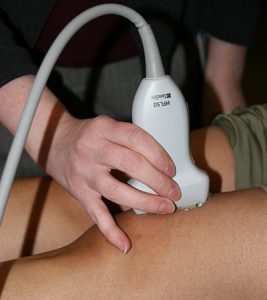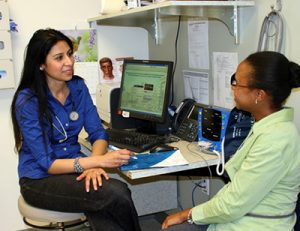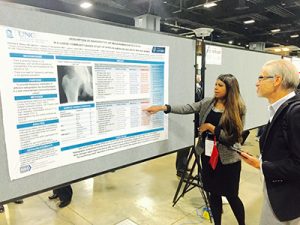
Dr. Richard Loeser Conducting First Study To Examine How Diet Alters Gut Bacteria, Potentially Leading to Osteoarthritis
The old adage, “you are what you eat,” is proving truer than we ever imagined. New research findings illustrate the negative impact Western diets can have upon the naturally occurring bacteria living in the “gut,” (known as the microbiota). Foods that are high in sugar and fat, commonly found in Western diets, can lead to alterations in these bacteria. These alterations lead to systemic inflammation as well as other changes that can increase the likelihood for the development and progression of a number of diseases.
UNC scientists are now conducting the first study that evaluates the potential for this process to lead to the development of osteoarthritis. The findings may help scientists develop new and personalized medical interventions that alter the composition of the gut microbiome in order to reduce pain, improve function, and slow or stop the progression of osteoarthritis – the most common type of arthritis, and a significant cause of pain and disability.
Richard Loeser, MD, Director of Basic and Translational Research at the Thurston Arthritis Research Center (TARC), and his co-investigators at the UNC School of Medicine recently received a three-year grant from the Arthritis Foundation to conduct this innovative study. Biological samples for the study will be provided by the ongoing Johnston County Osteoarthritis Project, which is directed by Dr. Joanne Jordan, Director of the Thurston Arthritis Research Center (TARC), and offers a large population-based study of patients in NC that will serve as an extensive source for clinical data.
“A number of recent studies show that the specific composition of the 100 trillion microbes within the intestine (gut microbiota) plays a central role in influencing how the food we eat affects the function of the immune system, allergic and inflammatory responses, and aging,” says Loeser. “However, as of yet, no one has studied the role of the gut bacteria in osteoarthritis.”
It is hoped that the findings from this research can help the medical community develop safe and effective interventions for overweight and obese adults with osteoarthritis, and perhaps others who develop the disease as well.
Dr. Amanda Nelson examines the effectiveness and feasibility of using ultrasound technology to study osteoarthritis in knee joints

While X-rays have long been the first option that clinicians and researchers turn to when assessing osteoarthritis (OA), the technology has its limitations. Too often, the findings from X-ray images don’t correspond well with patients’ symptoms, and X-ray images are not especially helpful in tracking the small changes that take place within the joints over time.
Thanks to a grant from the American College of Rheumatology, TARC scientist Amanda Nelson, MD, MSCR, RhMSUS is researching the potential for using ultrasound technology to study knee OA. Ultrasound offers numerous benefits compared to X-rays or even MRI for studying OA, including the fact that it is very cost-effective, widely available, reliable, and can identify OA changes at an earlier stage, when doctors are more able to make early interventions for the patient.
Her study, titled “Sonography of OA by Rheumatologists” (SOAR), will be integrated into the Johnston County Osteoarthritis Project (JoCoOA), which is evaluating the causes and societal implications of OA. The JoCoOA Project is managed by TARC and has been continuously funded for over 25 years.
Dr. Saira Sheikh pursues unique, “next generation” clinical trials focusing on direct molecular pathways to find new ways to treat lupus

Historically, treatment options for lupus have been limited to medications borrowed from other disease states such as arthritis, cancer, and organ transplant – to name a few.
To pursue a more direct treatment approach, clinical trials being conducted at TARC are exploring novel and innovative therapies that specifically target molecular pathways involved in the pathogenesis of lupus. In addition, they provide hope and options for patients who are refractory to currently available therapies. The goal is to develop highly targeted approaches tailored to treat the specific manifestations of this very heterogeneous disease with fewer side effects.
“We are exploring very direct, specific and innovative approaches that we hope will change the way lupus is treated, and ultimately transform the lives of our patients,” said Saira Sheikh, MD, Director of the TARC Clinical Trials Program. In addition to lupus, examples of TARC’s core areas of clinical and research expertise include: environmental, stinging insect, drug and food allergies; asthma; urticaria and angioedema; immunodeficiency; osteoarthritis, rheumatoid and psoriatic arthritis; gout and other crystal arthropathies; vasculitis; spondyloarthropathies; scleroderma; Sjogren’s syndrome; and many others.
Additional Recent Research Highlights
-

UNC Rheumatology Fellow Dr. Reshmi Raveendran presents her poster at the 2016 American College of Rheumatology annual meeting. Community-based physical activity and weight loss programs:
Research conducted under well-monitored and controlled circumstances shows that structured diet and exercise programs can significantly reduce pain for patients with knee OA. But the question remains: can such a program offer similar results in real-world, community settings? Weight-loss and Exercise for Communities with Arthritis in North Carolina (we-can) is a pragmatic study that will develop and evaluate a systematic, practical, diet-induced weight loss and exercise intervention that can be implemented successfully in community settings, and determine its effectiveness in reducing knee OA pain. Directed by Dr. Leigh Callahan, the UNC study sites include Johnston County and Haywood County.
- Alpha-gal allergy: TARC is one of only a few research sites in the U.S. that is studying this newly emerging and poorly understood mammalian meat allergy. TARC scientists, Drs. Maya Jerath and Scott Commins, are conducting basic, epidemiological, and clinical research, including identification of genetic and immunologic markers associated with this unique allergic response. They are working to shed light on alpha-gal allergy in order to better understand why the reactions occur several hours after eating red meat, and why some experience much more severe reactions than others. The ultimate goal is to develop ways to more accurately diagnose, prevent and hopefully, one day treat the allergy.
- Peanut and other food allergies: Dr. Edwin Kim, working within Dr. Wesley Burks’ UNC Food Allergy Initiative, continues to research novel modalities of treatment for food allergies. These include sublingual immunotherapy, oral immunotherapy, epicutaneous immunotherapy, and most recently subcutaneous immunotherapy. These treatments bring the promise of desensitization and protection against inadvertent exposures to food allergens as well as longer term potential for lasting tolerance.
- Immunizations: Drs. Saira Sheikh and Millie Kwan are TARC researchers who are evaluating better ways to address under-utilization of critical vaccinations for patients with inflammatory diseases. Their educational monograph, Vaccination in Adults with Chronic Inflammatory Conditions, was distributed nationwide to all board-certified allergists, immunologists and rheumatologists in the U.S. They are studying the success of the program to evaluate how it might be expanded to educate primary care and other specialties about the critical importance of immunizations.
- Physical therapy: Dr. Kelli Allen and other TARC researchers are conducting a large trial comparing the effectiveness of physical therapy and internet-based exercise training for individuals with knee OA. Dr. Yvonne Golightly worked with colleagues on a recent pilot study which examined the use of the physical therapist-led Otago Exercise Program and the Walk With Ease program to reduce the risk of falls in individuals with OA. Dr. Golightly and Dr. Abby Smith-Ryan will launch a new study this year to examine High Intensity Interval Training (HIIT) as a new physical therapy approach for managing knee OA.
- Genomics: Thanks to a grant from the NIH, Dr. Doug Phanstiel and his TARC colleagues are conducting research focused on developing new tools to identify DNA loops and applying them to study the role that loops play in immune response and inflammation. DNA loops are structures that bring regulatory regions of DNA – which are often hundreds of thousands of base pairs away from the closest gene – into close physical proximity of gene promoters, allowing for regulation of gene transcription.
- Data presentations: At the 2016 annual meeting of the American College of Rheumatology/Association of Rheumatology Health Professionals, TARC researchers presented new findings, leading six separate scientific presentations and workshops, and presenting 10 poster sessions with topics ranging from functional genomic screening to social influences in rheumatic diseases.